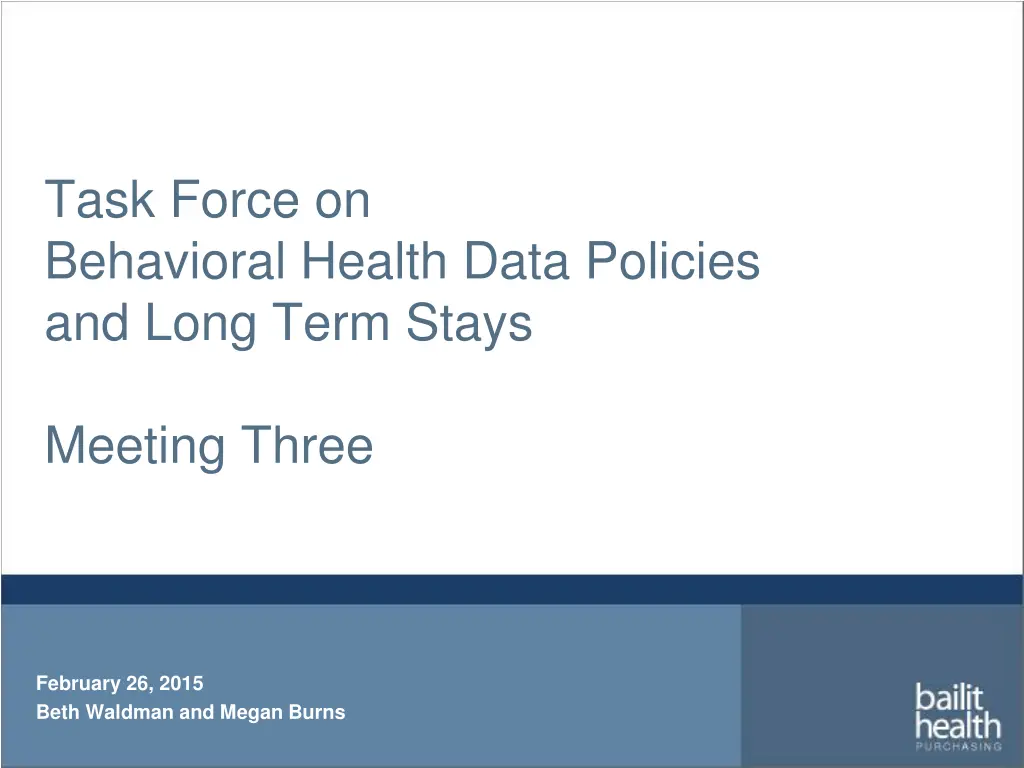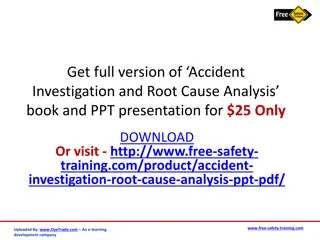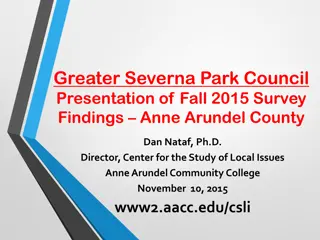
Task Force on Behavioral Health Data Policies and Long-Term Stays Meeting Overview
Explore the discussions and initiatives from the Task Force on Behavioral Health Data Policies and Long-Term Stays Meeting concerning reducing long-term patients in care facilities, psychiatric units, and emergency departments. Discover insights into ED boarding, duration of patient stays, and strategies for improving quality care for behavioral health patients.
Download Presentation

Please find below an Image/Link to download the presentation.
The content on the website is provided AS IS for your information and personal use only. It may not be sold, licensed, or shared on other websites without obtaining consent from the author. If you encounter any issues during the download, it is possible that the publisher has removed the file from their server.
You are allowed to download the files provided on this website for personal or commercial use, subject to the condition that they are used lawfully. All files are the property of their respective owners.
The content on the website is provided AS IS for your information and personal use only. It may not be sold, licensed, or shared on other websites without obtaining consent from the author.
E N D
Presentation Transcript
Task Force on Behavioral Health Data Policies and Long Term Stays Meeting Three February 26, 2015 Beth Waldman and Megan Burns
Agenda Welcome 9:30 am 9:40am Public Comment 9:40 am 9:55 am Long Term Stays: ED Boarding 9:55am 11:40am Follow-up Conversation on Data 11:40am 11:55am Next Steps 11:55am noon 2
Long Term Stays: Our Charge To make recommendations on how to reduce the number of long-term patients in DMH continuing care facilities, acute psychiatric units and emergency departments. 3
Complex, Interdependent System Today s Meeting March Meeting 4 Source: ED Length of Stay Issues for Behavioral Health Patients: Update. June 6, 2013. EOHHS
What is the Problem Were Trying to Solve? Increase in number of BH visits to the emergency department. (Chang et al, 2012). Average duration of BH patient stay in ED exceeds non- BH visit by 42%. (Chang et al, 2012) 40% of psychiatric ED visits typically lead to a hospital admission 2.5 times the rate for other conditions. (Owens et al, 2007) Boarding contributes to poor quality care for behavioral health patients and contributes to ED overcrowding. ED Boarding in Massachusetts is ill-defined, 5
What Do Providers and Families Believe Contributes to ED Boarding? Source: Massachusetts General Court Mental Health Advisory Committee Report Phase I and Phase II June 30, 2014. Abt Associates 6
Statewide Total Boarders by Month (July 2013 Dec 2014) (DPH Report) 7
Percentage of ED Visits Lasting 12 Hours or More (DPH) 9
Mental Health ED Boarding Mark Pearlmutter, MD, FACEP Associate Professor Tufts University School of Medicine VP and Chair, Emergency Network Services Steward Health Care 10
Focusing our Discussion Work Flow Metrics ED LOS mean (20.10) Total Length of Stay 19.44 Bed Request to Dept. 13.41 MHA to Bed Request 1.45 Med Clear to MHA 2.23 Door to Med 2.41 0 5 10 15 20 25 Hours Those patients without pre-arranged beds had mean LOS of 20.1 hours 11
What Work Has Already Been Done About ED Boarding? EOHHS Department of Public Health Boarding and Patient Flow Task Force (2009-2012) Department of Mental Health ED LOS and Psych Bed Access Initiative (2010-2012) ED Length of Stay Issues for Behavioral Health Patients (2013) Division of Insurance Study of differences in plan records between behavioral health and non behavioral health patients in the ED (2014) Legislatively mandated groups Mental Health Advisory Committee (2014) Special Commission examining the bed finder tool. (2014) 12
Identifying Recommendations We presented to you a subset of 68 different recommendations / suggestions by the various aforementioned Task Forces, Work Groups, Commissions, etc. Thank you for providing us with feedback on your thoughts about those recommendations. Today, we will discuss a potential consensus recommendation and then discuss potential additional recommendations through the lens of four component problems that were identified in your feedback. 13
Consensus Recommendation? Based on your feedback, we identified a potential consensus recommendation. Accept the December 2014 report from the Special Commission to Investigate the Expansion and Enhancement of the MABHA Website. Does everyone agree that bed finder website offered by MBHP is a useful tool and that the recommendations contained within the report should be acted upon by the legislature and the Administration? 14
Based on Your Feedback, We Identified Several Component Problems of ED Boarding 1. Difficult to manage patients are the hardest to place and have the longest lengths of stay in the ED. 2. While waiting for an inpatient psychiatric bed in the ED, patients often are not getting the care they need in the ED. 3. Data on the problem of ED boarding are sparse and inconsistent, and not all stakeholders are aware. 4. Other components? 15
Do these recommendations help place difficult to manage patients more quickly? Payment: Increased reimbursement for psychiatric inpatient admissions to allow for staffing and coordination of individuals with complex needs. (37) Support legislation (e.g., House Bill 1788 (2013-2014)) which would provide licensure of beds designated for difficult to manage patients or medically complex patients. (17) Increased participation by insurers in bed search and placement and increased reimbursement to the provider who must board the patient in their facility. (22) Develop pilots for alternative payment models involving multiple providers to reduce the ED LOS of difficult to manage patients, which includes incentives for inpatient psych units to maintain open difficult to manage beds. (Revised TFM) 16
Do these recommendations help place difficult to manage patients more quickly, cont.? Inpatient Service Availability / Capacity: Establish single authority to make determinations for placement for patients who have extended boarding, been refused admission or whose course of treatment is in dispute. (15) Establish piloting the use of single rooms / appropriate staffing ratio and other techniques that can help patients with aggressive behavior recover. (Revised 55) Regulation to provide appropriate staffing levels in all care facilities on the weekend. (19) DOI to develop standards to ensure plans have adequate BH networks. (14) Enforce no reject provisions in hospital contracts. (31) 17
Do these recommendations help ED boarders receive the care they need while awaiting an available bed? ED Processes / ESP Services: For EDs with no / little psych support at a minimum have telepsych consultations, contract with an ESP or psych consultation service. (55) ED Alternatives Consideration of Taunton State hospital or other sites for pilot programs that divert high acuity and dual diagnosis patients away from EDs. (18) Increase use of separate but adjacent psychiatric EDs within the hospital. (38) Create post-ED crisis pod that would serve to care for patients needing emergent mental health care pre-inpatient stay or in lieu of inpatient stay. (TFM) 18
Does this recommendations help stakeholders to define, measure and act upon ED Boarding? Recommendation: Improve data collection by EDs on ED boarders, their insurance status, clinical status and reasons for boarding. Share data with DPH and with insurers (for their members) (New) Potential dashboard measure: Number of patients in the emergency department that are ready to be discharged or admitted but unable to leave ED because they are waiting for available care in either the community or hospital. 19
Other Recommendations For Group to Consider? Are there other specific recommendations that you d like the group to discuss today? 20
Before it started snowing. In December, we discussed our goal to develop measures that would help the legislature assess the performance of the behavioral health system and to inform its investments of resources. We presented measures for consideration and collected your feedback. 21
In follow-up to our December Meeting and in Preparation for our 3/10 Meeting Bailit held a meeting with state agencies on 1/18 to identify issues across state agencies with data sharing. Attending agencies Center for Health Information and Analysis (CHIA), Health Policy Commission (HPC), MassHealth, Department of Public Health (DPH - Bureaus of Substance Abuse Services (BSAS) and Health Planning); Department of Mental Health (DMH), Division of Insurance (DOI), Attorney General s Office (AGO) 22
Key Findings from State Agencies Meeting Agencies devote significant resources to data collection and data analysis today There is a clear recognition of agencies of need to work together on some long standing and difficult to solve issues, including: Can't follow member through state agencies Different terms used by different agencies Privacy constraints: federal state law and agency policy 23
Discussion Topics for 3/10 Meeting Revisit measures discussion and tie to specific data needs and priorities Will produce matrix for your feedback with following columns: Measures Data Need/Source Frequency Stratification Priority Level Discuss potential recommendation to support state agencies in developing solutions to long-standing data issues 24
March Meetings March 10th: 9:30-noon: Focus on Data March 24th: 9:30-noon: Focus on Long Term Stays (inpatient and DMH continuing care facilities) Location for all remaining meetings: CHIA 501 Boylston Street 5th Floor, Newbury A & B 25
Contact Information For any questions contact: Beth Waldman: Megan Burns: Joe Vizard: bwaldman@bailit-health.com or 781-559-4705 mburns@bailit-health.com or 784-559-4701 joseph.vizard@state.ma.us or (new) 617-701-8313 26






















